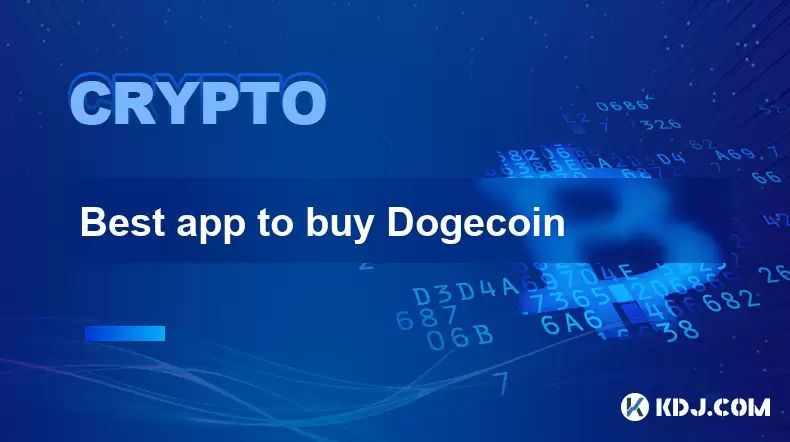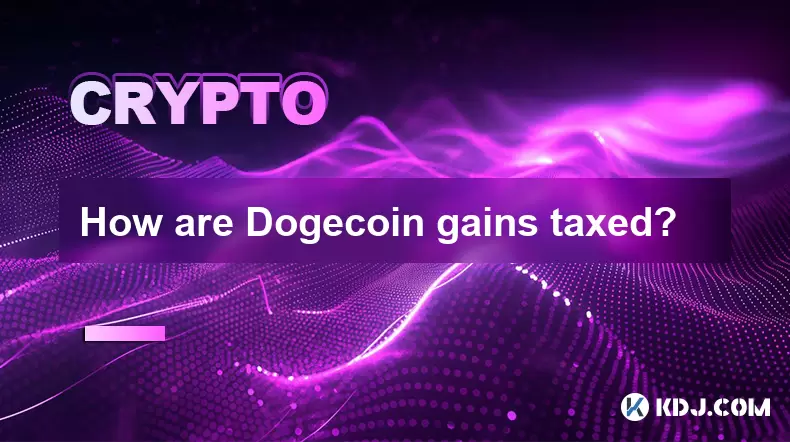-
 bitcoin
bitcoin $87959.907984 USD
1.34% -
 ethereum
ethereum $2920.497338 USD
3.04% -
 tether
tether $0.999775 USD
0.00% -
 xrp
xrp $2.237324 USD
8.12% -
 bnb
bnb $860.243768 USD
0.90% -
 solana
solana $138.089498 USD
5.43% -
 usd-coin
usd-coin $0.999807 USD
0.01% -
 tron
tron $0.272801 USD
-1.53% -
 dogecoin
dogecoin $0.150904 USD
2.96% -
 cardano
cardano $0.421635 USD
1.97% -
 hyperliquid
hyperliquid $32.152445 USD
2.23% -
 bitcoin-cash
bitcoin-cash $533.301069 USD
-1.94% -
 chainlink
chainlink $12.953417 USD
2.68% -
 unus-sed-leo
unus-sed-leo $9.535951 USD
0.73% -
 zcash
zcash $521.483386 USD
-2.87%
How to participate in staking Dogecoin? Is the yield high?
Dogecoin doesn't support native staking, but you can earn yield through lending platforms, DeFi protocols, or crypto savings accounts, each with varying risks and returns.
May 09, 2025 at 05:49 pm

Participating in staking Dogecoin can be an exciting way to earn passive income from your cryptocurrency holdings. However, it's essential to understand that Dogecoin does not support native staking. Unlike some other cryptocurrencies such as Cardano or Ethereum 2.0, Dogecoin operates on a Proof of Work (PoW) consensus mechanism, which does not involve staking. Instead, participants in the Dogecoin network mine new coins. Despite this, there are alternative ways to earn a yield on your Dogecoin, which we will explore in this article.
Understanding Dogecoin and Staking
Dogecoin, created as a lighthearted cryptocurrency in 2013, has gained significant popularity over the years. It uses the Proof of Work system, where miners compete to solve complex mathematical problems to validate transactions and add them to the blockchain. This process rewards miners with new Dogecoin. Staking, on the other hand, is a process used by cryptocurrencies that operate on a Proof of Stake (PoS) system, where participants lock up their coins to support the network's operations and, in return, receive rewards.
Since Dogecoin does not support staking, any mention of 'staking Dogecoin' typically refers to third-party platforms or services that offer yield-generating opportunities using Dogecoin. These platforms may not involve traditional staking but rather other financial mechanisms to generate returns.
Alternative Methods to Earn Yield with Dogecoin
While you cannot stake Dogecoin in the traditional sense, there are several alternative methods to earn a yield on your Dogecoin holdings. These methods include:
- Crypto Lending Platforms: Some platforms allow you to lend your Dogecoin to other users or institutions and earn interest on your holdings.
- Decentralized Finance (DeFi) Protocols: Certain DeFi platforms offer yield farming opportunities where you can deposit your Dogecoin into liquidity pools and earn rewards.
- Crypto Savings Accounts: Some exchanges and financial services offer savings accounts where you can deposit your Dogecoin and earn a yield over time.
Each of these methods has its own set of risks and potential rewards, and it's crucial to research and understand them before participating.
Using Crypto Lending Platforms
Crypto lending platforms are one of the most straightforward ways to earn a yield on your Dogecoin. Here's how you can get started:
- Choose a reputable platform: Research and select a platform that offers Dogecoin lending services. Popular options include platforms like Celsius Network, BlockFi, and Nexo.
- Create an account: Sign up for an account on the chosen platform and complete the necessary verification processes.
- Deposit your Dogecoin: Transfer your Dogecoin from your wallet to the lending platform's wallet.
- Lend your Dogecoin: Once your Dogecoin is deposited, you can choose to lend it out. The platform will match your Dogecoin with borrowers and you'll start earning interest.
- Monitor and withdraw: Keep an eye on your account to track your earnings. You can withdraw your Dogecoin and interest at any time, subject to the platform's terms and conditions.
The yield you can earn from lending Dogecoin varies depending on the platform and market conditions. Typically, yields can range from 2% to 8% annually, though these rates can fluctuate.
Engaging with DeFi Protocols
Decentralized Finance (DeFi) protocols offer another avenue to earn a yield on your Dogecoin. These platforms often involve more complex mechanisms, but they can potentially offer higher returns. Here's a step-by-step guide to get started with DeFi using Dogecoin:
- Select a DeFi platform: Find a DeFi platform that supports Dogecoin. Examples include platforms like Uniswap or SushiSwap.
- Connect your wallet: Use a compatible wallet like MetaMask to connect to the DeFi platform.
- Add liquidity: Deposit your Dogecoin into a liquidity pool on the platform. This typically involves pairing your Dogecoin with another cryptocurrency.
- Earn rewards: By providing liquidity, you'll earn a portion of the trading fees generated by the pool, as well as potential additional rewards offered by the platform.
- Monitor and manage: Keep track of your liquidity position and earnings. You can withdraw your Dogecoin and rewards at any time, but be aware of potential impermanent loss and other risks associated with DeFi.
The yields from DeFi can be significantly higher than traditional lending, sometimes reaching double-digit percentages annually. However, these higher returns come with increased risk, including smart contract vulnerabilities and market volatility.
Utilizing Crypto Savings Accounts
Crypto savings accounts are another option for earning a yield on your Dogecoin. These accounts are typically offered by centralized exchanges or financial services companies. Here's how to use them:
- Select a provider: Choose a reputable provider that offers Dogecoin savings accounts. Examples include exchanges like Binance or Coinbase.
- Sign up and verify: Create an account and complete the verification process required by the provider.
- Deposit your Dogecoin: Transfer your Dogecoin to the savings account.
- Earn interest: Your Dogecoin will start earning interest based on the rates offered by the provider.
- Withdraw as needed: You can withdraw your Dogecoin and interest at any time, subject to the provider's terms.
The yields from crypto savings accounts are generally lower than those from lending or DeFi, often ranging from 1% to 4% annually. However, they are typically more stable and easier to manage.
Evaluating the Yield on Dogecoin
The yield you can earn on your Dogecoin varies widely depending on the method you choose. Lending platforms typically offer moderate yields, while DeFi protocols can offer higher, but riskier, returns. Crypto savings accounts provide lower but more stable yields.
When evaluating the yield, consider the following factors:
- Risk vs. Reward: Higher yields often come with higher risks. Assess your risk tolerance and investment goals before choosing a method.
- Platform Reputation: Choose well-established and reputable platforms to minimize the risk of fraud or loss.
- Liquidity: Consider how quickly you can access your funds if needed. Some platforms may have withdrawal restrictions or fees.
- Market Conditions: Yields can fluctuate based on market conditions, so stay informed about the broader crypto market.
Frequently Asked Questions
Q: Can I stake Dogecoin directly on the Dogecoin blockchain?A: No, Dogecoin does not support native staking. It operates on a Proof of Work system, which does not involve staking.
Q: Are there any risks associated with earning a yield on Dogecoin through third-party platforms?A: Yes, there are risks including platform insolvency, smart contract vulnerabilities, market volatility, and potential loss of funds. Always research and understand the risks before participating.
Q: How often are yields paid out on lending platforms and DeFi protocols?A: The frequency of yield payouts varies by platform. Some platforms pay out daily, while others may pay weekly or monthly. Check the specific terms of the platform you are using.
Q: Can I use Dogecoin to participate in yield farming on DeFi platforms?A: Yes, some DeFi platforms support Dogecoin and allow you to add it to liquidity pools for yield farming. However, the availability and specific opportunities can vary.
Disclaimer:info@kdj.com
The information provided is not trading advice. kdj.com does not assume any responsibility for any investments made based on the information provided in this article. Cryptocurrencies are highly volatile and it is highly recommended that you invest with caution after thorough research!
If you believe that the content used on this website infringes your copyright, please contact us immediately (info@kdj.com) and we will delete it promptly.
- Bitcoin's Rocky Road: Inflation Surges, Rate Cut Hopes Fade, and the Digital Gold Debate Heats Up
- 2026-02-01 09:40:02
- Bitcoin Shows Cheaper Data Signals, Analysts Eyeing Gold Rotation
- 2026-02-01 07:40:02
- Bitcoin's Latest Tumble: Is This the Ultimate 'Buy the Dip' Signal for Crypto?
- 2026-02-01 07:35:01
- Big Apple Crypto Blues: Bitcoin and Ethereum Stumble as $500 Billion Vanishes Amid Macroeconomic Whirlwind
- 2026-02-01 07:35:01
- Michael Wrubel Crowns IPO Genie as the Next Big Presale: A New Era for Early-Stage Investments Hits the Blockchain
- 2026-02-01 07:30:02
- XRP, Ripple, Support Level: Navigating the Urban Jungle of Crypto Volatility
- 2026-02-01 06:35:01
Related knowledge

Bitcoincoin burning mechanism
Jul 20,2025 at 09:21pm
What is the Dogecoin burning mechanism?The Dogecoin burning mechanism refers to the process of permanently removing DOGE tokens from circulation by se...

How to earn free Bitcoincoin?
Jul 19,2025 at 10:08pm
What is Dogecoin and Why Earn It?Dogecoin (DOGE) started as a meme-based cryptocurrency in 2013 but has grown into a widely recognized digital asset. ...

Is Coinbase a good wallet for Bitcoincoin?
Jul 19,2025 at 04:42pm
Understanding Coinbase as a Wallet Option for DogecoinWhen considering where to store Dogecoin, Coinbase is often mentioned as a potential option due ...

How to buy Bitcoincoin with PayPal?
Jul 23,2025 at 06:57am
Understanding the Basics of Buying DogecoinBefore diving into the process of buying Dogecoin with PayPal, it’s essential to understand what Dogecoin i...

Best app to buy Dogecoin
Jul 23,2025 at 03:08pm
What Is a Cryptocurrency Exchange and How Does It Work?A cryptocurrency exchange is a digital marketplace where users can buy, sell, or trade cryptocu...

How are Dogecoin gains taxed?
Jul 25,2025 at 07:01am
Understanding the Taxation of Dogecoin GainsWhen it comes to Dogecoin (DOGE), many investors are drawn to its meme-inspired branding and volatile pric...

Bitcoincoin burning mechanism
Jul 20,2025 at 09:21pm
What is the Dogecoin burning mechanism?The Dogecoin burning mechanism refers to the process of permanently removing DOGE tokens from circulation by se...

How to earn free Bitcoincoin?
Jul 19,2025 at 10:08pm
What is Dogecoin and Why Earn It?Dogecoin (DOGE) started as a meme-based cryptocurrency in 2013 but has grown into a widely recognized digital asset. ...

Is Coinbase a good wallet for Bitcoincoin?
Jul 19,2025 at 04:42pm
Understanding Coinbase as a Wallet Option for DogecoinWhen considering where to store Dogecoin, Coinbase is often mentioned as a potential option due ...

How to buy Bitcoincoin with PayPal?
Jul 23,2025 at 06:57am
Understanding the Basics of Buying DogecoinBefore diving into the process of buying Dogecoin with PayPal, it’s essential to understand what Dogecoin i...

Best app to buy Dogecoin
Jul 23,2025 at 03:08pm
What Is a Cryptocurrency Exchange and How Does It Work?A cryptocurrency exchange is a digital marketplace where users can buy, sell, or trade cryptocu...

How are Dogecoin gains taxed?
Jul 25,2025 at 07:01am
Understanding the Taxation of Dogecoin GainsWhen it comes to Dogecoin (DOGE), many investors are drawn to its meme-inspired branding and volatile pric...
See all articles





















![THIS IS THE HARDEST COIN TO GET [POLY DASH] THIS IS THE HARDEST COIN TO GET [POLY DASH]](/uploads/2026/01/31/cryptocurrencies-news/videos/origin_697e0319ee56d_image_500_375.webp)




















































